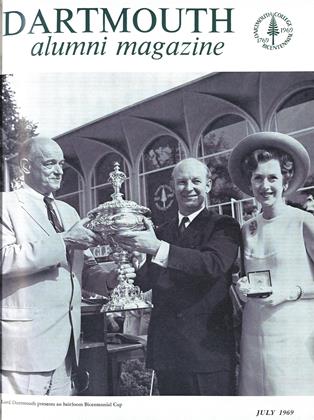ANTS WILL NOT EAT YOUR FINGERS A SELECTION OF TRADITIONAL AFRICAN POEMS.
JULY 1969 RICHARD D. TAYLORANTS WILL NOT EAT YOUR FINGERS A SELECTION OF TRADITIONAL AFRICAN POEMS. RICHARD D. TAYLOR JULY 1969
Edited by LeonardW. Doob '29. New York: Walker andCompany, 1966. 127 pp. $3.95.
A CROCODILE HAS ME BY THE LEGAFRICAN POEMS. Edited by LeonardW. Doob '29. Illustrated by SolomonIrein Wangboje in woodcuts. New York:Walker and Company, 1967. 49 pp. $3.50.
Spontaneity and joy are not very common responses to the complexities of modern life, and our more recent extravagances of civilization move us even further from any contact with the serenity induced by such a unity of culture as existed in traditional Africa. Ants Will Not Eat Your Fingers offers a splendid selection of traditional African poems which does, in fact, suggest an ordered universe and reflects the vigor of man's emotions in coming to terms with it.
The preface makes a point of disclaiming thesis or scholarly intention of any kind; the sole criterion for selection being the editor's personal preference. The individual poems are chosen from an impressive range of sources and represent a large number of cultures as well as a wide gamut of reponses to the human condition. Ordered alphabetically by society or tribe, there is an added freshness, vitality, and element of surprise in the sudden shifts of subject matter and tone occasioned by the juztapositions. The poems themselves are fun and magnificently evoke a real and immediate world through exact detail and a focus on basic human situations and reactions. Man's creative power in the confrontation with his universe is everywhere present, the savour and relish of his essential humanity.
I lie on my back looking upwards; Even so, I do not see the Supreme Being. What, then, do you expect When you sprawl there on your belly?
Many of the verses from Professor Doob's selection reappear in the collection entitled A Crocodile Has Me by the Leg, and the volume is quite specifically designed for readers of all ages. Grouped by similarity of theme, the poems are ordered in such a way as to both describe and comment on the human cycle from birth to death. The absence of verses on adult love-relationships and sophistocated human observation, for ample, give volume a chaste and example air."but the poems are nonetheless charmingiy direct and truthful in their treatment of an immediate and accessible world.
The large, chunky block illustrations in red and black designed by Mr. Wangboje offer an admirable reflection of the verses themselves and fully complement the introduction to the culture of traditional Africa which the book provides. Human figures are reduced to characteristic outlines and attitudes, and they are conceived in complete harmony with local surroundings. Nature itself and cultural artifacts are exaggerated and stylized for the purpose of expressing an essential character or function. The integration of man, nature, and the supernatural is most happily presented in a simple single vision.
Assistant Professor of English at DartmouthCollege, Mr. Taylor, granted a DartmouthCollege Faculty Fellowship, will spend thenext academic year in London doing research on the Japanese theatre.
 View Full Issue
View Full Issue
More From This Issue
-
 Feature
FeatureThe Bicentennial Year Officially Opens with Ceremony and Fanfare
July 1969 -
 Feature
FeatureThe 50-Year Address
July 1969 By DR. ROBERT M. STECHER '19 -
 Feature
FeatureCOMMENCEMENT 1969
July 1969 -
 Feature
FeatureThe Senior Valedictory
July 1969 By KENNETH IRA PAUL '69 -
 Feature
FeatureA New Investment Concept: Total Return
July 1969 By JOHN F. MECK '33 -
 Feature
FeatureHONORARY DEGREE CITATIONS
July 1969
Books
-
 Books
BooksAlumni Publications
FEBRUARY 1929 -
 Books
BooksWarren E. Carleton 'l4 is the author
DECEMBER 1931 -
 Books
BooksBOLIVAR
November 1941 By Herbert F. West '22 -
 Books
BooksSAMSON OCCOM
June 1936 By James Dow McCallum -
 Books
BooksSTRUCTURAL PRINCIPLES IN OLD ENGLISH POETRY.
JANUARY 1969 By L. DEAN PEARSON -
 Books
BooksFaculty Books
March 1953 By Leonard D. White '14


